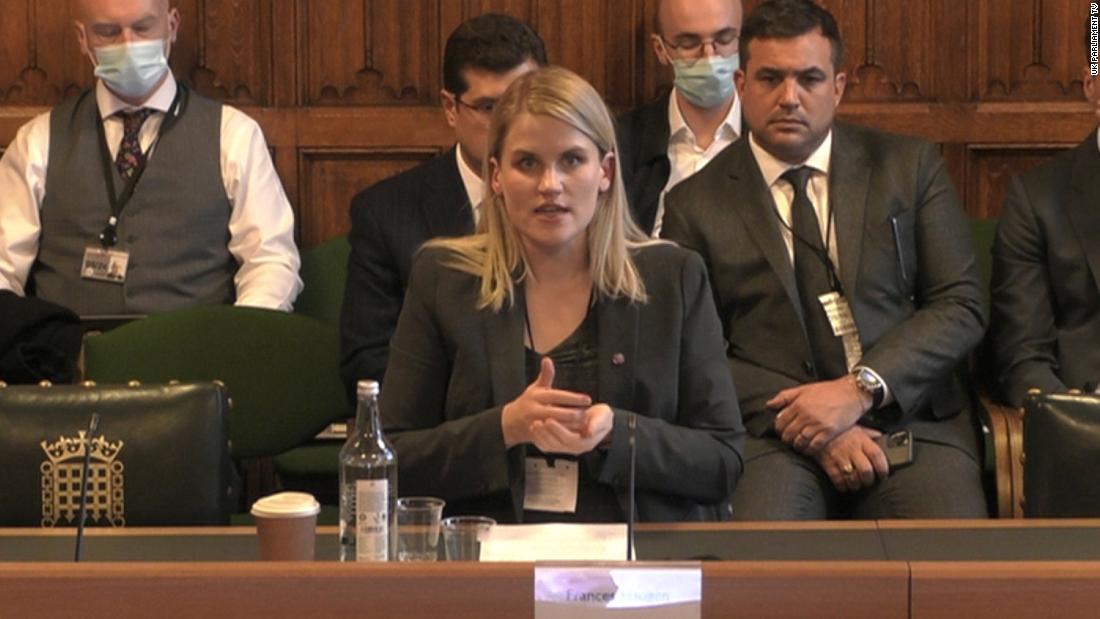- CNN is publishing a series of articles based on more than ten thousand pages of leaked internal Facebook documents, referred to as "The Facebook Papers."
- They give deep insight into the company's internal culture, its approach to misinformation and hate speech moderation, internal research on its newsfeed algorithm, and communication related to Jan. 6.
- These documents are disclosures made to the SEC and provided to Congress in redacted form by Facebook whistleblower Frances Haugen’s legal counsel. The redacted versions were obtained by a consortium of 17 US news organizations, including CNN.
- Haugen is testifying in the UK parliament today.
Situations in Ethiopia and Myanmar are "opening chapters of a novel that is going to be horrific to read," whistleblower says
From CNN's Niamh Kennedy
The situations in Ethiopia and Myanmar are the “opening chapters of a novel that is going to be horrific to read” Facebook whistleblower Frances Haugen said during her testimony to a UK Parliamentary committee Monday.
Haugen shed light on the company's use of so-called “glass break measures.”
Haugen said Facebook knows based on its engagement-based rankings when the temperature in a country “gets hotter”, name checking places like Myanmar which didn't have any hate speech classifying labelling systems.
They allow the temperature in these countries to get hotter and hotter and hotter when the pot starts boiling over, they're like, 'Oh no, we need to break the glass, we need to slow the platform down,'” she said.
Haugen said the company has a “strategy” of only slowing down the platform when “the crisis has begun”, deploying its “glass break measures” instead of making the platform “safer as it happens.”
Haugen told US senators in a damning testimony on Oct. 5 that the social media company was aware its platform was being used to stir up ethnic violence in Ethiopia and Myanmar.
Haugen: Facebook should not be allowed to "mislead" its Oversight Board
From CNN's Charles Riley

Facebook should not be allowed to mislead its Oversight Board, whistleblower Frances Haugen told UK lawmakers on Monday, saying the body should demand more transparency from the social media giant.
"This is a defining moment for the Oversight Board. What relationship does it want to have with Facebook? I hope the Oversight Board takes this moment to stand up and demand a relationship that has more transparency," said Haugen.
"If Facebook can come in there and just actively mislead the Oversight Board — which is what they did — I don’t know what the purpose of the oversight board is," she added.
The Facebook Oversight Board is made up of experts in areas such as freedom of expression and human rights. They were appointed by the company but operate independently. The board is often described as a kind of Supreme Court for Facebook.
Last week, the board said that Facebook failed to provide crucial details about its "Cross-Check" program that reportedly shielded millions of VIP users from normal content moderation rules.
Facebook uses Cross-Check to review content decisions relating to high-profile users, such as politicians, celebrities and journalists. The program had mushroomed to include 5.8 million users in 2020, according to the Wall Street Journal.
On Sunday, Oversight Board member and PEN America CEO Suzanne Nossel said that Facebook must do a better job with transparency.
The board adjudicates cases on controversial content that is both left up or taken down — but these cases are just "the tip of the iceberg" when it comes to oversight at Facebook, Nossel said on CNN's "Reliable Sources."
"They didn't want to bear the full weight of responsibility for big questions like, 'Should Donald Trump be allowed on the platform,'" Nossel said. "I think they're very ambivalent about regulation."












0 Comments